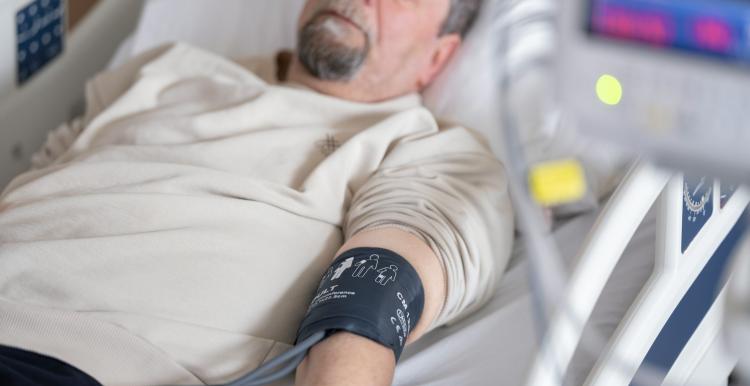Men would come forward for prostate cancer screening

New Healthwatch England research shows the majority of men would come forward for testing if invited as part of any future national prostate screening programme.
One in eight men affected
Improving cancer outcomes is a key aim of the first ever national men’s health strategy, and a new national cancer plan, both due out by the end of the year.
Launching its public call for evidence on the strategy, the Department of Health and Social Care (DHSC) noted that prostate cancer, a male-only disease, was now the most common cancer diagnosed in England.
Overall, one in eight men will develop prostate cancer, usually after the age of 50. For Black men this risk doubles to one in four and from an earlier age. Overall, the number of men dying from prostate cancer totals more than 10,000 men every year.
Behind stark statistics lie human stories. Team GB Olympian Chris Hoy last year disclosed he’d received a terminal diagnosis of prostate cancer in his late 40s, after first seeking help for shoulder pain. He’d had no symptoms of prostate problems, and the pain was caused by a secondary tumour from the spreading cancer.
The current NHS approach
There is no national prostate screening programme to routinely invite men for testing, like there is for bowel, breast and other major cancers. Wes Streeting, the Health and Social Care Secretary, said in April he backed the principle of a national screening programme, but would be ‘guided by the evidence’ from experts.
The Department for Health and Social Care (DHSC) didn’t ask men for their views on screening in their call for evidence on men’s health strategy, so Healthwatch England wanted to plug this evidence gap. The poll, of more than 3,500 men aged 18+ in England, is believed to be the first to ask men if they would take part in any future programme.
Would men attend screening?
In contrast to evidence that men are reluctant to attend other services across the health and care system, Healthwatch findings show:
High likelihood of men attending screening
- 79% of all men said they would be likely to attend an appointment when invited, if the NHS introduced prostate screening routinely.
- This rises to 81% for Black men – an important finding for health inequalities, given their increased risk.
Likelihood increases with age
- 89% of men aged 65-74 in the poll said they’d be likely to attend.
- This decreased to 65% of men aged 18-24.
People on low incomes less likely to attend
- 67% of people who said they were financially ‘really struggling’ said they would attend if invited.
- Likelihood increased to 89% for respondents who were ‘very comfortable’ financially.
Reasons for reluctance
In the poll, 7% of men said they would be unlikely to take part in any future screening programme, and we asked them to select reasons why:
- 25% of this group of men generally don’t like medical appointments
- 22% would prefer to wait until they had any symptoms
- 21% don’t think they’re at risk of prostate cancer.
The second figure here in particular shows a need for greater awareness, as prostate cancer is often asymptomatic (no noticeable symptoms) until later stages.
Why all men aren’t routinely tested
There has been no national screening programme for prostate cancer because the Prostate-specific antigen (PSA) blood test - is regarded as clinically unreliable. It sometimes shows ‘false positives’ and puts men through unnecessary anxiety and biopsies. It can also lead to detection of early and slow growing cancers - the treatment for which can cause side effects such as incontinence or erectile dysfunction, which are often more harmful than leaving the cancer alone.
However, campaigners told an MPs’ inquiry last year that a targeted national screening programme, perhaps with more advanced technology, was necessary. They argued it would stop the NHS missing cancer in men most at risk, but who find it a topic they’re too uncomfortable to raise with doctors – or simply can’t get help for due to access barriers.
The government is now waiting for the UK National Screening Committee to decide on six options for a targeted national screening programme, such as screening Black men aged 45-70 or screening all men with a close relative who’s had prostate, breast or ovarian cancer.
How GPs respond to men’s requests for PSA tests
Navigating the existing guidance on men’s rights to a PSA can be difficult.
Current DHSC guidance tells GPs not to proactively promote the PSA test to asymptomatic men, putting the onus on men to request it themselves.
However, guidance is not consistent on whether men without symptoms have the right to a PSA test, regardless of a doctor’s clinical judgement.
‘Men aged 50 and over who decide to have a PSA test based on this balanced information [on the pros and cons of a test, discussed with their GP] can do so for free on the NHS’, states guidance dating back to 2016, as well as the Prostate Cancer UK website.
However, the patient information page on PSA tests on the NHS website states that men ‘can ask their GP for a PSA test’ but doesn’t say whether men should have their request met.
In other DHSC guidance, men are told: ‘Before making a decision, you may want to talk to your GP, practice nurse, partner, family members or friends.’
This may be why people are reporting to the Healthwatch network that they don’t always have their PSA requests met.
Healthwatch England asked poll respondents who were aged 50 or over (1,706 in total), if they’d ever asked their GP for a PSA test and, if so, what happened:
- 60% of men aged 50 and over had not requested a PSA test
- 36% of men aged 50 and over had asked for a PSA test
- Seven per cent of those who had asked for a PSA test had been refused (although due to that sample being under 100, this figure should be treated with caution).
Share your experience
Have you recently:
- Been diagnosed with prostate cancer?
- Had a diagnostic test for prostate cancer?
- Asked for a diagnostic test for prostate cancer but been refused?
Can you spare 5-10 minutes to tell us about your experience? Your evidence helps us to make recommendations to the BLMK Integrated Care Board about how to develop men's health services in the future.
Photo by Engin Akyurt on Unsplash

